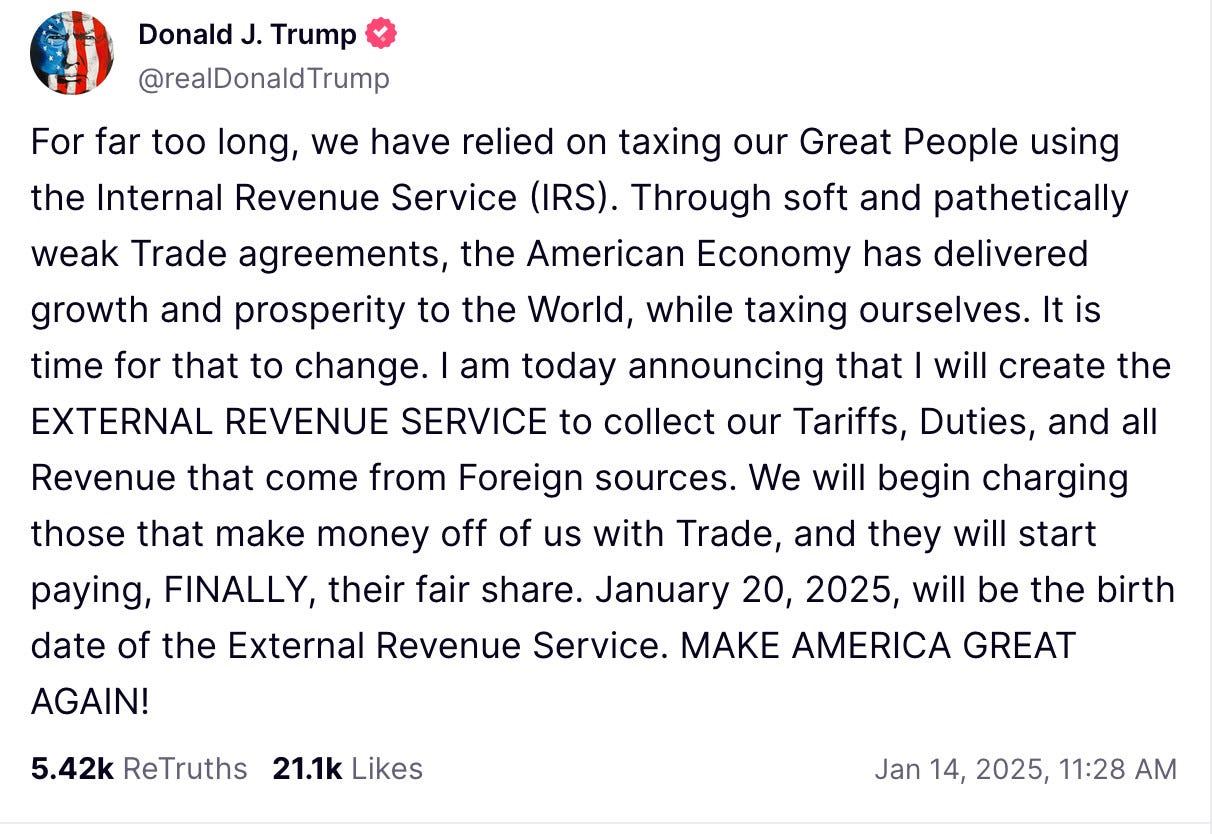Donald Trump won in November because many voters believed that he would bring down grocery prices; Republicans apparently still think he will, even though he himself admitted — after the election, of course — that it would be “very hard.” Here’s a clearer picture, via Briefing Book, showing that while Democrats, like most economists, expect inflation to rise under Trump, Republicans believe that he will somehow stop it dead in its tracks:
But what will he actually do? Even though he will take office in just a few days, we have almost no idea.
That’s not because the Trump team is keeping its plans closely held, nor is it because there are major factional fights. All the evidence suggests, instead, that Trump’s economic team still doesn’t have any plans, or even concepts of plans. All it has are some half-formulated thoughts about how to cater to Trump’s prejudices without doing massive economic damage.
Consider this report from Bloomberg:
Members of President-elect Donald Trump’s incoming economic team are discussing slowly ramping up tariffs month by month, a gradual approach aimed at boosting negotiating leverage while helping avoid a spike in inflation, according to people familiar with the matter.
One idea involves a schedule of graduated tariffs increasing by about 2% to 5% a month, and would rely on executive authorities under the International Emergency Economic Powers Act, the people said.
The proposal is in its early stages and has not yet been presented to Trump, the people said — a sign that a monthly stepped approach is early in the deliberation process.
If you spend even a minute thinking about this proposal, you realize that it makes no sense. Phasing in, say, 25 percent tariffs over around 8 months would do almost nothing to mitigate their inflationary impact. Prices would almost surely shoot up as soon as the plan was announced! It would, in addition, induce a mad stampede to get imports in before the full tariffs go into effect — a sort of supply-chain version of the Oklahoma land rush, pictured at the top of this post.
So what’s going on here? I don’t think it’s sheer stupidity. What’s happening instead is that Trump’s economic “advisers” realize that tariffs would increase the cost of living, but don’t dare say that clearly when their boss is still posting stuff like this:
So Trump’s economic “advisers” are thrashing around in an effort to cater to Trump’s tariff obsession while somehow delaying or finessing the consequences. I use scare quotes around “advisers” because there’s no reason to believe that Trump will pay attention to advice that contradicts his prejudices.
And they know that. So where Lincoln famously assembled a team of rivals, Trump is assembling a team of yes-men.
Consider Kevin Hassett, who will soon head the National Economic Council, effectively becoming the government’s top economist. He served in the first Trump administration; his most memorable contribution was a model — actually just a crude exercise in curve-fitting — predicting that Covid would quickly fade away, with no deaths after mid-May 2020.
Clearly, Hassett saw his job as being to tell Trump whatever he wanted to hear. There’s no reason to expect him to behave differently this time.
Stephen Miran, whom Trump has tapped to lead the Council of Economic Advisers, is arguably a more interesting case. Back in November he wrote “A User’s Guide to Restructuring the Global Trading System,” which might qualify as a manifesto if it were intelligible. My sense, however, is that reporters like the Wall Street Journal’s Greg Ip writing about the document have struggled to make sense of what Miran is saying.
I, however, don’t find Miran puzzling at all, thanks to my long experience as (among other things) an economics professor at MIT, Princeton and CUNY. You see, I recognize the genre. Most years, at least one student tries to BS his way through the term paper requirement by producing something with a bunch of learned-sounding references and some gratuitous equations, hoping that you won’t notice the absence of any coherent argument.
And when I say lack of coherence I don’t mean that I disagree; I mean that the document simply doesn’t hang together. Part 3 makes the case for tariffs by arguing that they won’t be inflationary because they’ll lead to a stronger dollar, reducing import prices. Part 4 then calls for an all-out effort to weaken the dollar, using emergency powers if necessary.
Oh, and Miran’s plan for weakening the dollar involves pressuring foreign governments to stop accumulating dollar reserves — in effect, diminishing the role of the dollar as a reserve currency. (That wouldn’t work, but never mind.) Let’s hope nobody tells Trump, who has threatened to impose punitive tariffs on any country that dares move away from the dollar.
OK, I’m probably spending too much time on Miran, who is unlikely to have real policy influence. But then who will?
Which brings me back to my starting point: the incoming administration doesn’t seem to have any economic plan. But the ultimate reason for that absence is fear: everyone is afraid to say anything that might be taken as an implicit contradiction or criticism of Trump’s rantings.
So what will actually happen? During his first term, aside from a limited trade war with China, Trump did very little; as a practical matter, Mitch McConnell was in charge of economic policy. This time around, who knows? Maybe the administration will just drift, talking big but not doing much; or maybe Trump will actually try to be the second coming of William McKinley. There is, however, a real possibility that he’ll do crazy stuff — and the bond market seems to be noticing.
MUSICAL CODA
And now something hipster from Brooklyn (and there’s nothing wrong with that)







I am so glad you left the NYT and are free to express your opinions now!
Anybody else getting the vibe of Russia in the early 90s? Instead of Yeltsin "Legless in Limerick," we have an increasingly addled premier whom a collection of oligarchs confidently expect that they will be able to manipulate. The question is, who walks away with Gazprom and who ends up falling out of a window? Remember also that lots of Russian middle class got their savings wiped out by the looting of the chaotic Yeltsin era.